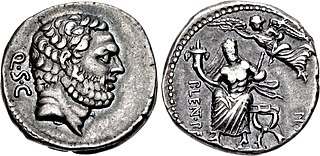Related Research Articles
Publius Cornelius Dolabella was a Roman politician and general under the dictator Julius Caesar. He was by far the most important of the patrician Cornelii Dolabellae but he arranged for himself to be adopted into the plebeian Cornelii Lentuli so that he could become a plebeian tribune. He married Cicero's daughter, Tullia, although he frequently engaged in extramarital affairs. Throughout his life he was an extreme profligate, something that Plutarch wrote reflected ill upon his patron Julius Caesar.

Publius Cornelius Lentulus Spinther was a Roman politician and general. Hailing from the patrician family of the Cornelii, he helped suppress the Catilinarian conspiracy during his term as curule aedile in 63 BC and later served as consul in 57 BC. Denied the opportunity to invade Egypt the following year, he nevertheless won some victories in his province of Cilicia and celebrated a triumph over it in 51 BC.
Publius Cornelius Lentulus Sura was one of the chief figures in the Catilinarian conspiracy. He was also the step-father of the future triumvir Mark Antony.
Lucius Cornelius Lentulus Crus was Consul of the Roman Republic in 49 BC, an opponent of Caesar and supporter of Pompeius in the Civil War during 49 to 48 BC.
Gnaeus Cornelius Lentulus Vatia was the Roman owner of a gladiatorial school in ancient Capua. It was from this school that, in 73 BC, the Thracian slave Spartacus and about 70 to 78 followers escaped. The breakout led to the slave rebellion known as the Third Servile War.
Cornelia was the daughter of Scribonia and her second husband. She was stepdaughter to Octavian through her mother's third marriage and half-sister to Julia the Elder, Augustus' only biological child.

The gens Cornelia was one of the greatest patrician houses at ancient Rome. For more than seven hundred years, from the early decades of the Republic to the third century AD, the Cornelii produced more eminent statesmen and generals than any other gens. At least seventy-five consuls under the Republic were members of this family, beginning with Servius Cornelius Maluginensis in 485 BC. Together with the Aemilii, Claudii, Fabii, Manlii, and Valerii, the Cornelii were almost certainly numbered among the gentes maiores, the most important and powerful families of Rome, who for centuries dominated the Republican magistracies. All of the major branches of the Cornelian gens were patrician, but there were also plebeian Cornelii, at least some of whom were descended from freedmen.
Marcus Cornelius Cethegus was a Roman Republican consul and censor during the Second Punic War, best known as a political ally of his kinsman Scipio Africanus.
Gnaeus Cornelius Lentulus Marcellinus was a Roman statesman and consul of 56 BC. He was married at least twice. His first wife is unknown but his second wife was probably Scribonia, at least twenty years his junior, who later became the second wife of Augustus.
Gnaeus Cornelius Lentulus Gaetulicus was a Roman senator and general. He was ordinary consul in the year 26 with Gaius Calvisius Sabinus as his colleague. Gaetulicus was involved in a plot against the emperor Caligula, and following its discovery he was executed.
Cossus Cornelius Lentulus Gaetulicus was a Roman senator and general, who was consul in 1 BC with Lucius Calpurnius Piso the Augur as his colleague.
Gnaeus Cornelius Lentulus "Augur" was a politician and general of the early Roman Empire during the reign of Augustus, who became consul in 14 BC as the colleague of Marcus Licinius Crassus Frugi. Enormously wealthy, he reputedly was forced by emperor Tiberius to commit suicide in 25 AD.
Gnaeus Cornelius Lentulus is the name of several ancient Romans, including:
Lucius Cornelius Lentulus was a suffect consul in 38 BC, in the late Roman Republic.
Lucius Cornelius Lentulus was a Roman politician and military officer who served as consul in 3 BC.
Publius Cornelius Lentulus Marcellinus was a Roman Senator who was elected Roman consul in 18 BC, with Gnaeus Cornelius Lentulus as his colleague. During his consulship, the Senate and the Roman assembly again conferred upon the Roman emperor Augustus his extraordinary promagisterial authority and his Tribunician power.
Lucius Cornelius Lentulus Lupus served as a Roman consul in 156 BC alongside his colleague Gaius Marcius Figulus.
Cossus Cornelius Lentulus was a Roman senator, who was active during the reign of Tiberius. He was consul in the year AD 25 as the colleague of Marcus Asinius Agrippa. Except for his consulship, the only office Lentulus might have held is governorship of Germania Superior, as Edmund Groag conjectured.
Gnaeus Cornelius Lentulus served as quaestor of the Roman Republic in 212 BC, curule aedile and consul in 201 BC. His brother Lucius Cornelius Lentulus was also consul in 199 BC. Gnaeus was possibly the son of L. Cornelius L. f. L. n. Lentulus Caudinus, curule aedile in 209 BC, though the presence of the praenomen Gnaeus, along with the absence of the agnomen Caudinus, are opposed to this connection.
References
- ↑ Alison E. Cooley, The Cambridge Manual of Latin Epigraphy (Cambridge: University Press, 2012), p. 452